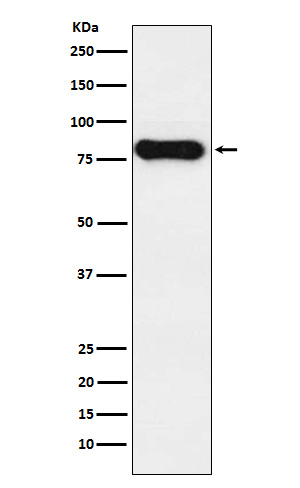
| WB | 1/500-1/1000 | Human,Mouse,Rat |
| IF | 咨询技术 | Human,Mouse,Rat |
| IHC | 1/50-1/100 | Human,Mouse,Rat |
| ICC | 技术咨询 | Human,Mouse,Rat |
| FCM | 咨询技术 | Human,Mouse,Rat |
| Elisa | 咨询技术 | Human,Mouse,Rat |
| Aliases | Ig delta chain C region |
| Entrez GeneID | 3495 |
| WB Predicted band size | Calculated MW: 42 kDa; Observed MW: 84 kDa |
| Host/Isotype | Rabbit IgG |
| Antibody Type | Primary antibody |
| Storage | Store at 4°C short term. Aliquot and store at -20°C long term. Avoid freeze/thaw cycles. |
| Species Reactivity | Human |
| Immunogen | A synthesized peptide derived from human IGHD |
| Formulation | Purified antibody in PBS with 0.05% sodium azide. |
+ +
以下是关于人类IgD抗体的3篇代表性文献及其摘要概括:
---
1. **文献名称**:*IgD signaling regulates survival and plasma cell differentiation in human B cells*
**作者**:Chen, K., et al.
**年份**:2016
**摘要**:该研究揭示了IgD通过结合Fcδ受体(FcδR)激活B细胞内的促生存信号通路(如PI3K/AKT),并促进浆细胞分化。实验表明,IgD缺陷会导致B细胞凋亡增加及抗体分泌减少,提示其在体液免疫中的关键作用。
---
2. **文献名称**:*The role of IgD in mucosal immune homeostasis*
**作者**:Cerutti, A., et al.
**年份**:2011
**摘要**:本文发现IgD在黏膜免疫(如呼吸道、肠道)中通过结合嗜碱性粒细胞和肥大细胞表面的IgD受体,诱导抗菌肽(如β-defensin)分泌,从而增强黏膜屏障防御病原体的能力。
---
3. **文献名称**:*IgD autoantibodies in systemic lupus erythematosus: Pathogenic or bystander?*
**作者**:Küppers, R., et al.
**年份**:2019
**摘要**:该研究探讨了系统性红斑狼疮(SLE)患者中IgD自身抗体的高表达现象,发现其与疾病活动度相关,可能通过激活补体途径或干扰B细胞耐受机制加剧自身免疫反应。
---
如需更多文献或特定研究方向,可进一步补充检索关键词(如“IgD class switching”或“IgD in allergies”)。
Human IgD antibodies, a lesser-studied immunoglobulin class, play unique roles in immune regulation. Discovered in 1965. IgD exists predominantly as membrane-bound monomers on mature B cells, co-expressed with IgM. Its structure features a heavy chain (δ) with a flexible hinge region, influencing antigen binding. Unlike other antibodies, serum IgD levels are low (≈0.03 mg/mL) due to short half-life and limited secretion.
Functionally, membrane IgD serves as a B cell receptor (BCR) critical for lymphocyte maturation and activation. It fine-tunes immune responses by modulating B cell tolerance thresholds and enhancing antigen presentation. Soluble IgD interacts with basophils and mast cells, triggering antimicrobial and pro-inflammatory cytokine production through cross-linking with FcδRs.
Clinically, elevated IgD levels (>100 IU/mL) mark Hyper-IgD Syndrome, an autoinflammatory disorder linked to mevalonate kinase mutations. IgD myeloma accounts for 2% of plasma cell malignancies, often presenting with renal complications. Recent research highlights its potential in vaccine adjuvants and immunotherapy targets, though its precise physiological mechanisms remain partially enigmatic compared to other antibody classes.
×